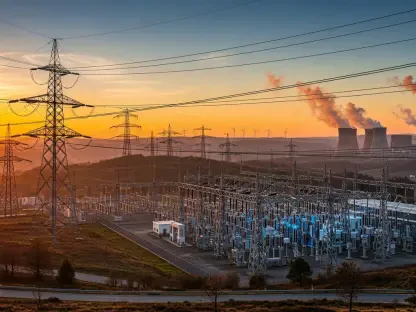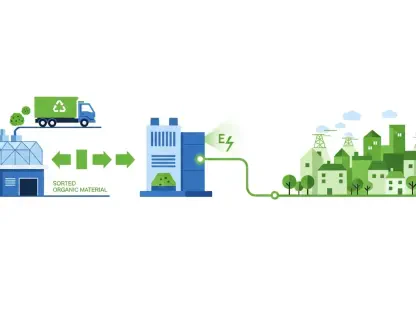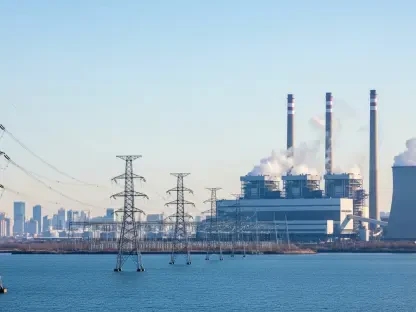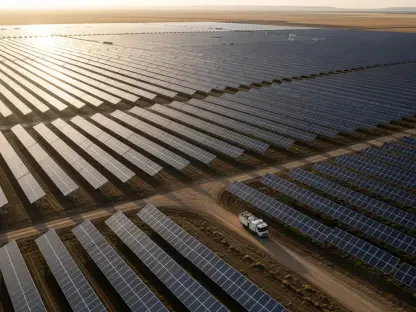The year 2022 has witnessed a significant acceleration in global energy efficiency progress, potentially marking a turning point after years of slow improvement. This surge in energy efficiency is largely a response to the soaring fuel prices and fuel supply disruptions experienced worldwide, prompting governments and consumers to prioritize efficiency measures. Through ambitious government policies, spending commitments, and public campaigns, there has been a notable rise in investments focused on enhancing energy efficiency.
Growth in Global Investments in Energy Efficiency
Surge in Investments
In 2022, global investments in energy efficiency reached USD 560 billion, reflecting a 16% increase compared to 2021. These investments encompass various improvements, including building renovations, public transportation infrastructure, and electric car infrastructure. Preliminary data indicate that in 2022, the global economy used energy 2% more efficiently than in 2021. This rate of improvement is nearly four times greater than that of the previous two years and almost double the rate of the past five years. The notable rise in investments is partially driven by policy initiatives and the growing awareness of the need for a sustainable and resilient energy future.
In particular, building renovations have seen a significant boost as governments and private sectors aim to reduce the carbon footprint of existing structures. This includes upgrading insulation, installing energy-efficient windows, and adopting smart building technologies that optimize energy use. Public transportation infrastructure has also received considerable attention. Investments in electric buses, expanded metro systems, and bike lanes promote a shift from private car use to more sustainable modes of transport, helping to reduce overall energy consumption. Electric car infrastructure investments aim to support the growing number of electric vehicles (EVs) on the road. By enhancing charging networks and integrating renewable energy sources, these investments ensure that EVs are viable and environmentally friendly options.
Impact on Consumers and Economies
An analysis by the International Energy Agency (IEA) found that since 2000, energy efficiency actions have greatly benefited consumers and economies. These actions have resulted in total energy bills in IEA countries being USD 680 billion less in 2022 than they would have been otherwise, representing about 15% of total energy expenditure. Investments in building insulation and efficient cars have particularly saved consumers thousands of dollars each year. Moreover, these savings translate into broader economic benefits, including reduced energy import dependence and enhanced energy security.
The financial relief provided by energy efficiency measures is particularly crucial in times of volatile fuel prices. By lowering the overall energy demand, countries can mitigate the impact of global energy market fluctuations. Additionally, efficient energy use contributes to reducing greenhouse gas emissions, supporting climate goals, and fostering sustainable economic growth. Investments in energy efficiency create jobs, stimulate innovation, and promote technological advancements. As the global economy transitions towards a greener future, these investments lay the foundation for a resilient, low-carbon economy.
Significance of Sustained Energy Efficiency Improvements
Relation to Net Zero Emissions by 2050
The article emphasizes that if the current rate of progress continues and is built upon in the coming years, 2022 could mark a crucial turning point for efficiency. Sustained energy efficiency improvements are vital for international efforts to reach net zero emissions by 2050. The IEA report stresses that improving energy efficiency is the best immediate response to the global energy crisis, exacerbated by Russia’s invasion of Ukraine. By reducing energy consumption, countries can lessen their reliance on volatile fossil fuel markets and enhance their energy security.
The IEA’s Net Zero Emissions by 2050 Scenario highlights the critical role that energy efficiency plays in the transition to a sustainable energy system. If countries maintain and accelerate their current pace of efficiency improvements, they can make significant progress toward their climate goals. This involves not only technological advancements but also changes in consumer behavior and infrastructure development. Policies supporting energy efficiency must be robust and forward-thinking, ensuring that all sectors of the economy contribute to the overall reduction in energy consumption and emissions.
Historical Context and Current Challenges
IEA Executive Director Fatih Birol draws a parallel with the oil shocks of the 1970s, which triggered significant governmental efforts to improve energy efficiency in cars, appliances, and buildings. Birol highlights that energy efficiency is essential for addressing today’s energy crisis because of its substantial potential to resolve the issues of energy affordability, security, and climate change. The global energy crisis, exacerbated by geopolitical tensions and supply chain disruptions, underscores the importance of efficient energy use.
By looking at historical precedents, policymakers can learn valuable lessons and avoid past mistakes. Rigorous standards for appliances and buildings, along with incentives for adopting energy-saving technologies, are critical components of an effective energy efficiency strategy. However, achieving sustained progress requires continuous innovation, investment, and public awareness. Governments and industries must work together to overcome barriers and promote practices that enhance energy efficiency. This collaborative approach is essential for addressing the multifaceted challenges of the current energy landscape.
Recent Setbacks and Encouraging Signs
Impact of the Covid-19 Pandemic
Despite recent progress, energy efficiency faced setbacks in previous years, particularly during the Covid-19 pandemic. The pandemic led to a downturn, with annual gains dropping to around 0.5% in 2020 and 2021 due to a contraction in other sectors and slower rates of retrofits and upgrades in buildings and factories. Even before the pandemic, the global rate of improvement had declined from 2% in the first half of the last decade to 1.3% in the second half. This slowdown highlighted the fragility of progress and the need for sustained efforts to maintain and enhance energy efficiency.
The pandemic-induced economic downturn affected various industries, delaying investments and projects aimed at improving energy efficiency. However, as economies recover, there is an opportunity to prioritize energy efficiency in stimulus packages and recovery plans. By incorporating energy efficiency measures into economic recovery strategies, governments can create jobs, reduce emissions, and foster long-term resilience. The lessons learned during the pandemic can inform future strategies, ensuring that energy efficiency remains a cornerstone of sustainable development.
Accelerating Electrification and Strengthening Building Codes
For energy efficiency improvements to align with the IEA’s Net Zero Emissions by 2050 Scenario, they need to average about 4% annually this decade. Encouragingly, there are signs of progress, such as the accelerating electrification of transport and heating. One in every eight cars sold globally is now electric, and in Europe, nearly 3 million heat pumps are expected to be sold in 2022, up from 1.5 million in 2019. Additionally, building codes are being strengthened continuously, and new ones are being introduced, especially in emerging and developing economies.
The shift towards electrification represents a significant step forward in reducing carbon emissions and enhancing energy efficiency. Electric vehicles and heat pumps are more efficient than their fossil fuel counterparts and can be powered by renewable energy sources. Strengthening building codes ensures that new constructions meet high energy efficiency standards, reducing the energy demand from the outset. Existing buildings can also benefit from retrofitting to improve insulation and integrate smart technologies that optimize energy use. By pursuing these measures, countries can make substantial strides toward achieving their energy efficiency and climate goals.
Policy and Funding Announcements
Major Initiatives in Advanced Economies
The article highlights several significant policy and funding announcements in 2022 that suggest sustained investment and progress in energy efficiency. These include the United States’ Inflation Reduction Act, the European Union’s REPowerEU plan, and Japan’s Green Transformation (GX) programme, collectively accounting for hundreds of billions of dollars in spending over the coming years on more efficient buildings, cars, and industries. These initiatives demonstrate a strong commitment to energy efficiency and signal a positive trajectory for future progress.
Such policies provide a comprehensive framework for tackling energy efficiency from multiple angles. For instance, the Inflation Reduction Act includes incentives for residential and commercial buildings to adopt energy-saving technologies. The REPowerEU plan focuses on reducing dependence on fossil fuels through increased renewable energy adoption and improved energy efficiency measures. Japan’s GX programme emphasizes the need for a green transformation across industry sectors. These policies not only address domestic energy efficiency challenges but also contribute to global efforts to mitigate climate change and promote sustainable development.
Need for Investment in Emerging Economies
However, it is noted that much of this investment is concentrated in advanced economies, indicating a pressing need for more significant investment in emerging and developing economies. Ensuring continued and increased investment, especially in these regions, remains critical to achieving the goal of net zero emissions by 2050. Emerging economies often face unique challenges, such as limited access to finance and technology, which can hinder their progress toward energy efficiency.
Addressing these challenges requires international cooperation and support. Advanced economies can play a pivotal role by sharing knowledge, technology, and financial resources with emerging economies. Multilateral development banks, international organizations, and private sector investors must collaborate to create conducive environments for energy efficiency investments in developing regions. By doing so, the global community can ensure a more equitable and effective transition towards a sustainable energy future. Strengthened partnerships and targeted investments can unlock the potential of emerging economies, contributing to global energy efficiency goals.
Looking Ahead
Upcoming IEA Global Conference on Energy Efficiency
In 2022, the world saw a major uptick in energy efficiency progress, which could signify a dramatic shift after years of sluggish advancement. This boost in energy-saving efforts is primarily due to the sharp increase in fuel prices and disturbances in fuel supplies globally. These challenges have made both governments and consumers more conscious about the importance of energy efficiency. As a result, there has been a substantial focus on efficiency measures through bold government policies, financial commitments, and widespread public awareness campaigns. Investments aimed at improving energy efficiency have surged, underscoring the urgency to address energy concerns. The year brought about significant policy initiatives and funding directed toward finding innovative solutions that consume less energy but maintain productivity. Public campaigns have also played a crucial role in educating people about the benefits of energy efficiency, which can lead to long-term savings and reduced environmental impact. This collective effort marks a pivotal moment in the push for a more energy-efficient future.









